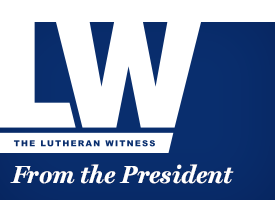Thugs, primaries, and refugees – oh my! These, along with snow storms, tornadoes and drought are just some of what we face early on in 2016.
Speaking to this at the beginning of the new year, David Brooks wrote in a New York Times op-ed, “Fear is an emotion directed at a specific threat, but anxiety is an unfocused corrosive uneasiness. … [Anxiety] induces a sense that the basic systems of authority are not working, that those in charge are not keeping people safe. People are more likely to have a background sense that life is nastier and more precarious — red in tooth and claw. They pull in the tribal walls and distrust the outsider. This anxiety makes everybody a little less humane.” 1
Brooks strikes a nerve with me. Fears have objects. Anxieties have nebulous ghosts that haunt. Together they are legion. 2
Yet I am struck not only by what Brooks illuminates, but by what he ignores; namely the ways in which the media (in all of its various forms) tends to perpetuate and exacerbate both our fears and our anxieties.
This leads me to a simple question: How much of my daily peace and well-being is slavishly tied to daily news and cultured voices? The answer is also quite simple: Far too much.
Lord have mercy. In the midst our our fears and anxieties, oh Lord, abide with us!
Time and again, the Lutheran Confessions convey such comfort and hope. As the confessions also approach their 500th Anniversary, it’s easy for me think of them as cold, ahistoric dogmas written in an age now and forever covered in shadows.
Yet when I open them, I am always wonderfully shocked to find how amazingly they publish good news of great joy in Christ to us in our times, even as I trust they have been through all these years. Take for instance this brief section from the Apology of the Augsburg Confession:
Psalm 50[:15] [reads]: “Call on me in the day of trouble, I will deliver you.” This is how God wants to become known and worshiped, namely, that we receive blessings from him, and indeed, that we receive them on account of his mercy and not on account of our merits. This is the richest consolation in [the midst of all fears and anxieties]! 3
God in Christ is not simply with us. He is with us in our times of trouble!
We pray that those who report news and make art at the national level will do so in ways that are faithful to their callings. But we also realize that the world which they present and report to us is precisely the fallen and broken world that longs for grace and the Messiah Jesus, who has now come. We see that longing in fear-inducing reports. We feel that longing in anxious times.
Yet we do not place our trust in chariots or horses. Nor does our trust lie with poets, political pundits, or reporters. But we trust in the name of the Lord our God. May our hearts therefore trust in God’s grace and mercy and peace which he has published upon his people, once and for all time, in Christ Jesus our Lord.
Rev. David J. Rufner is the pastor at New Hope Lutheran Church in Hudsonville, Mich.
Footnotes:
1 David Brooks, ‘The Age of Small Terror,’ The New York Times – Op-Ed, 1.5.2016
2 An allusion to Mark 5:9,15, and Luke 8:30 (ESV).
3 ‘The Book of Concord,’ Kolb/Wengert, Fortress Press, 2000, p 130:60.




